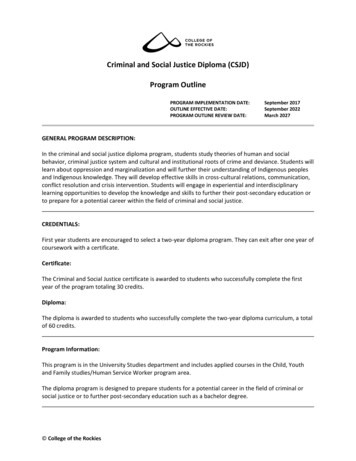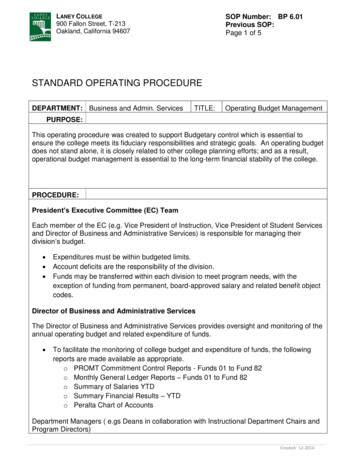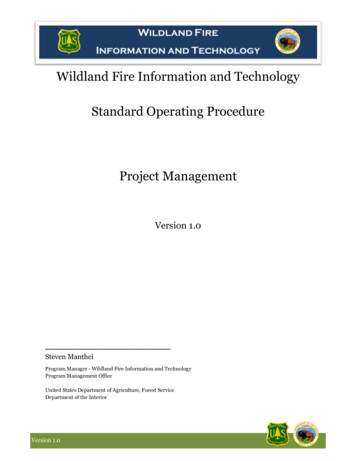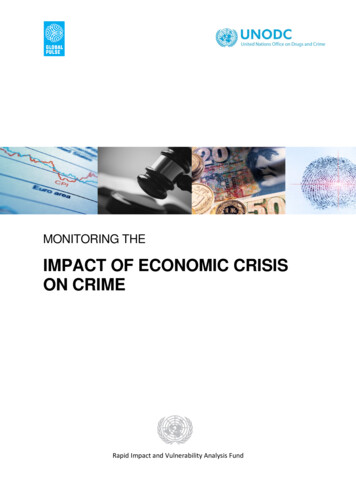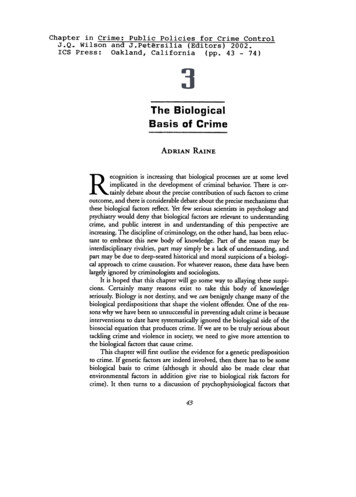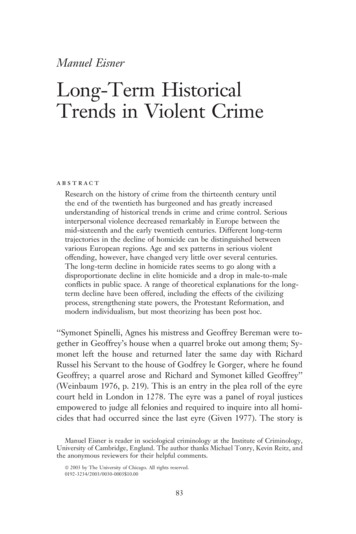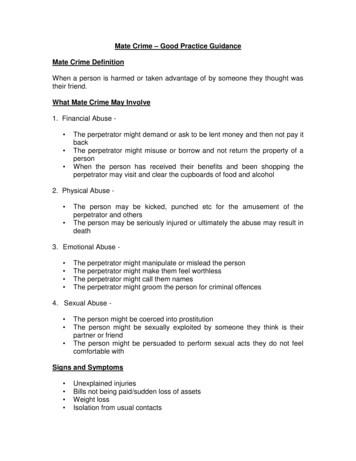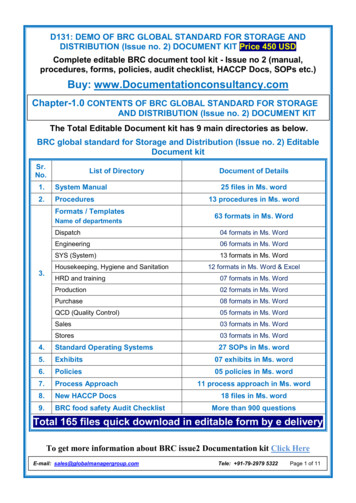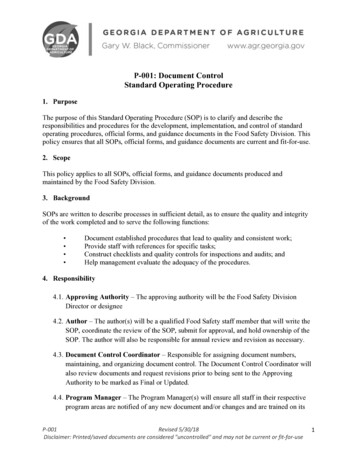
Transcription
The Republic of Somaliland Police ForceStandard Operating ProcedureCrime InvestigationsCriminal Justice Compendiumfor Somaliland
Standard Operating ProcedureCrime InvestigationCriminal Justice Compendium for SomalilandFebruary 2015
AcknowledgementsThe Standard Operating Procedure for Crime Investigation in Somaliland was prepared under the auspices of theCriminal Justice Programme (CJP) of the UNODC Regional Office for Eastern Africa (ROEA).Standard Operating Procedures TeamResearch, writing and editing:David James Davis (Consultant).ROEA and Somaliland CJP personnel who provided support to the preparation and publication of theStandard Operating Procedure for Crime Investigation in Somaliland:Rebecca Nyandiwa, Mohamoud Hassan and Abdifatah Mohammed.Translation support:Tubali Ltd.Layout and design:400 Communications Ltd.SupervisionLoide Lungameni (UNODC ROEA Representative), Matteo Pasquali (UNODC ROEA Head of the CJP),Simon Charters (UNODC Programme Coordinator CJP Somaliland).Experts consulted in the preparation of the Standard Operating ProcedureUNODC wishes to acknowledge the valuable contributions received from experts from a range ofbackgrounds, including Mr. Abdillahi Iman Fadal (Police Commissioner), and the members of the PoliceTraining Committee: Mr. Dahir Muse Abraar (Head of the National CID), Mr. Abdillah Hassan Farah(Regional Police Commander), Mr. Abdi Hassan Ismand (Head of the CID Investigations), Mr. AhmedHussein Liban (Head of the Special Branch) and Mr. Jamma Hareer Yusuf (National Trainer Advisor).The preparation of this Standard Operating Procedure for the Police in Somaliland benefited fromthe financial contribution of the Department of State of the United States of America as part of theircontribution to the UNODC Criminal Justice Programme in Somaliland.DisclaimersThis document has not been formally edited.The contents of this publication do not necessarily reflect the views or policies of UNODC or contributoryorganizations and neither do they imply any endorsement.The designations employed and the presentation of material in this publication do not imply the expressionof any opinion whatsoever on the part of UNODC concerning the legal status of any country, territory orcity or its authorities, or concerning the delimitation of its frontiers or boundaries.Copyright 2014, United Nations Office on Drugs and Crime (UNODC).
p. 5
Contentsp. 61. Introduction to the Standard Operating Procedure (SOP) - Crime Investigation72. Background to the preparation of the ‘SOP - Crime Investigation’83. Key Roles in Crime Investigation94. Key stages in Crime Investigation105. Definition of ‘Serious Crime’116. Official Police Records127. Dealing with initial Complaints / Reports148. Planning the Investigation199. Interviewing Victims and Witnesses2110. Examining Crime Scenes and Searching2511. Arrest and Interviewing of Suspects3212. Completing Report to the Prosecutor39Specimen Police Investigative File42
1. Introduction to the Standard OperatingProcedure (SOP) - Crime Investigationp. 7One of the primary roles of the Police in Somaliland is to prevent and investigate crime in an effective,efficient and fair manner. This function is an essential part of the wider role of the Police to ensure thecommunity safety of all its citizens.In order to deliver an effective and efficient investigative function, the Police needs to have and work toa structured and documented operational procedure that is standardized, is in accordance with the lawsgoverning the investigation of crime, is human rights compliant and reflects international best practice.The generic name given to such a document is ‘Standard Operating Procedure’ (SOP). The benefits of workingto a set SOP include: Standardised Investigative ProcessThis enables a consistent approach to investigation. Common MethodologiesThis delivers the best methods to complete the various stages of an investigation. Development of Best PracticeThis identifies and encourages improved and better ways of working and discourages bad practice. Professional StandardsThis delivers recognised processes, procedures, supervision and minimum standards.
2. Background to the preparation of the ‘SOP Crime Investigation’p. 8In order to deliver a SOP for Crime Investigation, the Somaliland Police Commissioner authorised theestablishment of a committee of representatives from the Somaliland National Police Service who havespecific and detailed knowledge, skills and experience of investigating crime and managing investigations.The Somaliland Police Representatives included the Head of National CID, Head of CID Investigations, Headof National Special Branch, Hargeisa Regional Police Commander and the Police Training and CurriculumAdvisorThe purpose of the SOP Committee was to: Identify current ways in which crime is investigated in Somaliland, taking into account regionaldifferences and current best practice. Develop improved ways of conducting such investigations with increased emphasis on professionalismand management supervision. Recommend improvements in procedure with particular emphasis on introducing international bestpractice Document the key processes, procedures and supervisory functions for crime investigation in an SOP.The SOP Committee was supported in their work by crime investigative experts from the United NationsOffice on Drugs and Crime (UNODC), Hargeisa Office, Somaliland.The SOP also incorporates elements of the Serious Crime Operations - Training Manual which is a separatedocument prepared for the Somaliland Police by UNODC.
3. Key Roles in Crime Investigationp. 9In order to deliver and maintain an effective criminal investigative process, a number of key roles are criticalto the process at the police station and regional level. They are listed in chronological order of use in crimeinvestigations:Occurrence Book (OB) Writer. The OB Writer is normally the first police contact with a victim or thirdparty who is reporting a crime, and they are normally located in a specific ‘reception’ office at the front of apolice station.The OB Writer is responsible for recording details of all crimes and incidents that are reported for the localpolice area in the police station Occurrence Book (OB), which is the primary document used for this purpose.Investigator. The Investigator is normally an experienced officer who is based in the local police station andhas a primary responsibility for the investigation of reported crime.Duty Officer*. The Duty Officer is a person who is on call or present in the police station during a 24 hourperiod. He is an experienced officer who is responsible for managerial oversight of the effective running ofthe police station.Head of Investigations.* The Head of Investigations is responsible for the management and supervision ofall criminal investigations conducted for the local police area.Station Commander.* The Station Commander is in overall command of the local police area and the policestation, and is directly responsible and accountable for all police investigations and police activity.Regional Commander.* The Regional Commander is in overall command of a Somaliland Police Regionand is directly responsible and accountable of all policing activity in the region* For the purposes of this SOP these roles are also referred to as Police Managers.
4. Key stages in Crime Investigationp. 10The SOP Committee identified and agreed six key stages of the investigation process in Somaliland. Thesestages relate to all types of crime and comprise:1. Dealing with the initial complaint / report2. Planning the Investigation3. Interviewing Victims and Witnesses4. Examining Crime Scenes and Searching5. Arrest and Interviewing Suspects6. Completing the Report to the ProsecutorIn the majority of cases, each investigation will commence with stage 1 and then - dependent on the natureof the crime being investigated - will proceed through each element to stage 6.Some investigations may conclude prior to stage 6, for example investigations that reveal that the initialcomplaint was false or misleading, or that the evidence is clearly insufficient to merit the completion of aprosecution report.It is also possible that some crime investigations may commence at a different stage in the process. Forexample, an investigation may start with the arrest of the suspect at stage 5, but it will still be necessary tobacktrack through the relevant stages prior to this stage in order to fully complete a competent investigation.
5. Definition of ‘Serious Crime’p. 11In order to set a distinction between serious crimes (i.e. those crimes that require an urgent and specialistresponse), and lesser crimes that can be investigated in a more routine manner, the SOP Committee determinedthat serious crime is defined as: Murder Rape and Sexual Crime Robbery Serious Assault Kidnapping Corruption Arson All acts of Terrorism All acts of Piracy All acts of Human Trafficking All acts of Drugs Trafficking Any attempts or conspiracy to commit the above Any other crimes that result in serious physical injury to a victim Any other crime which can result in a term of imprisonment of five years or over, as determined by thePenal Code
6. Official Police Recordsp. 12As part of the recording and investigative process, the Somaliland Police use a number of official policerecords:Occurrence Book (OB)The OB book is the single most important police crime/incident record in use in Somaliland and is used inall Police Stations across the Somaliland.It is used to record the detail of all formal complaints to the police, records the details of suspects arrested,and in some cases it may record the results of crime investigations.It is important to note that it is only used to record offences that are determined as ‘crimes’ under the PenalCode and not the lesser offences determined as ‘contraventions’.It is used as a source and reference document by the Police Managers who have a responsibility to provideoversight, supervision and direction to criminal investigations.It is also used as a primary recording document in some specialised units, such as HQ, National CID and theSexual Offence Referral Centre.It is a source document that is used to provide the annual crime statistics of Somaliland.Crime RegisterThis is a register that is similar to, and follows on from, the OB book. It is used to record the detail andprogress of specific investigations, and it is cross referenced back to the OB book at the local police stationwhere the crime was first reported.It is currently used by HQ CID, and it is believed that it is also used in some of the larger urban police stations.Prisoner Property RegisterThis document is believed to exist in most police stations and is used to record the detail of all property thatis taken from suspects who are arrested and placed in detention at a police station.Exhibits RegisterThis document is also believed to exist in most police stations and is used to record the detail of all physicalevidential exhibits that are recovered by the police and kept for subsequent production to a criminal court.Investigation ReportThe police generally use an investigation report format that follows a certain style and structure. This is anunwritten process that arose from much earlier, but it is a since-lost documented procedure, and its continueduse is perpetuated by the memory and practice of the older police officers. It is generally a very robustand well-presented report style that covers the chronology of the investigation, to include reference to keyevidence from victims, witnesses and suspects.
p. 13Police – Prosecution Case FileDuring the investigative process, the police will prepare a case file to some sort of standard format. This isvery much dependent on local practice and the availability of older and more experienced supervisors whostill remember historic best practice.The types of case file fall into two distinct groups: Serious CrimeFor serious criminal investigations, the police generally use a pre-printed docket folder that contains astructured record of a case file, which will include victim and witness statements, crime scene records,suspect interviews, and investigation reports etc. Minor CrimeFor minor criminal investigations the police generally use plain folders and will again include victim andwitness statements, suspect statements and investigation reports etc.
7. Dealing with initial Complaints / Reportsp. 14This is one of the most critical stages of a crime investigation, so the Police must immediately work to the‘Golden Hour’ principle that is the ‘conceptual hour’ at the start of any investigation when the greatestopportunities to recover evidence occur.As investigative time progresses, the opportunities for evidence recovery will decrease, potential witnesseswill be lost, crime scenes will deteriorate and suspects will escape.General Actions:First Responder (Any Police Officer) Immediately locate, identify and protect the victim. Be particularly responsive to ‘Vulnerable Victims and Witnesses’, such as:–– Women–– Children (Under 15)–– Elderly–– Infirm or Sick–– Displaced Persons–– Mentally Ill–– Refugees This should include affording special protection to additional ‘High Risk’ groups such as victims andwitnesses of serious crime where there is a potential risk for the person to be subject to assault, revengeor reprisal attack. Where appropriate, use female officers to deal with female victims and witnesses. In the case of child victims ensure that one or more of the parents are present - if not, use relatives. If a victim is injured make sure they receive immediate medical attention from a doctor or are taken to ahospital. Note their physical condition and general demeanor. Ensure that their initial account of events is recorded as evidence. If the suspect is present ensure they are arrested and searched (see the Arrest and Search section of theSOP for more detail). If the victim is making an allegation of a serious sexual crime, such as rape, the victim must be examinedby a competent doctor at the earliest opportunity. Details of the examination must be recorded by the doctor and presented in written from as part of awitness testimony.
p. 15OB Writer Make an initial assessment of the nature and seriousness of the crime. If it appears to be a serious crime make sure the following persons are notified immediately:–– Duty Officer (this person can inform the below)–– Head of Investigations–– Station Commander–– Regional Commander If the crime appears to be of a minor nature ensure that the Duty Officer is informed at the earliestopportunity. For both serious and minor crimes, make a detailed entry in the station OB book, where possible from theaccount given by the victim. If this is not possible, use the account of a witness or third party representativeof the victim. Record brief details of the allegation and identify and record the principal criminal offence that appearsto have been committed, along with the relevant article from the Penal Code. Ensure the OB entry is signed in a style that makes the name readable. Ensure that Supervisory Officers are shown the detail of the entry, and are given the opportunity to signthe entry. Ensure any follow up details (such as more suspect information etc) are entered into the OB book as soonas practicable. Also ensure that the following records, where they exist, are also made:Crime RegisterDetails of the crime and criminalsPrisoners Property RegisterDetails of seized prisoner's propertyExhibits RegisterRecord of all potential evidential exhibits
p. 16Duty Officer Ensure that all immediate police actions are carried out, such as:–– Victim is provided with urgent medical assistance where necessary;–– Any suspects arrested are taken to police station and kept secure;–– Any property or potential evidential exhibits are correctly recorded and placed into safe police storage;–– Details of witnesses are recorded, and–– Crime scenes are identified and initial efforts made to keep them secure. In the case of an emergency, identify and assign Investigators to the case. Deal with all initial contacts with the media, including providing any initial press briefings or requests formedia calls for witnesses or information. In the case of serious crimes, ensure that the Station Commander, Head of Investigations and RegionalCommanders are notified. Identify the victim’s family, and ensure they are kept informed of the condition of the victim and whereappropriate the progress of the investigation.Head of Investigations(This may also be the role of an Investigator in cases of minor criminal investigations.) In consultation with the Station Commander, assign or confirm the assignment of the Investigator(s) to the case,ensuring that the officer(s) chosen have the right knowledge, skills and experience to conduct the investigation. In cases of serious crime, assume the role of ‘Senior Investigating Officer’, which includes takingresponsibility for all policy and decision-making elements of the investigation. At the earliest opportunity carry out a review of all the police actions taken to date and, where necessaryor relevant, carry out or order any remedial actions. Establish whether a crime has occurred - this will include checking all known facts, identifying any gapsin knowledge, and taking actions to improve the evidential facts of the case. If suspects have been arrested and taken into police custody, ensure they have been properly searched,initial evidence of the arrest has been recorded, and all their property and any potential evidence recoveredand stored safely and securely. Take over responsibility for the identification and security of potential crime scenes and make urgentarrangements to have them examined. Identify key locations where ‘house to house’ enquiries may provide a source of potential witnesses orevidence to the investigation, and direct that those enquiries take place. Provide the Investigator(s) with sufficient resources to undertake the investigation, i.e. transport, logisticsand communications. Consider early liaison with the Regional Prosecutor's Office. Take over media responsibilities from the Duty Officer, in consultation with the Station Commander.
p. 17Investigator At the earliest opportunity commence a written ‘Diary of the Investigation’. This should include as aminimum the following information:–– Date and time investigation commenced–– Brief details of the crime or incident–– Summary of the evidence / complaint–– Initial police actions–– Police decisions on how to commence the investigation–– Record all investigative steps: Victims interviewed, with a brief summary of their evidence, Witness interviewed, with a brief summary of their evidence, Searches and crime scene examined, with a summary of the result, Suspects interviewed, with a brief summary of what they have said, and Names of the Investigator(s). Details of initial and priority lines of investigation. Record the Supervisor’s review of the investigation, including decisions made. Details of liaison, contact and meetings with Prosecutors. Any other relevant information that has an impact on the investigation. The diary of the investigation must then be maintained on a regular basis and must record, in chronologicalorder (date and time), all decisions and actions taken during the investigation. Make arrangements to record a full statement of evidence from the victim(s), to include the identification,recovery and presentation of evidential exhibits. Treat the victim as a potential ‘crime scene’, so consider taking photographs and making notes of thevictim’s general condition and demeanor. Identify ‘key witnesses’. These are the persons who can have the potential to provide the most criticalevidence to the subsequent investigation. Ascertain a brief account of what they have seen or what other evidence they can provide. Make arrangements to record a full statement of evidence from witnesses at the earliest opportunity. Ensure that witnesses are kept separate and interviewed in private. Consider urgent ‘house to house’ enquiries in the vicinity of the potential crime to identify further witnessand recover evidence. Each Investigator must ensure that they have access to, and carry, a personal pocket notebook. This mustbe used to record the chronological list of events at this stage of the investigation. It must be used to record evidence such as that listed in the actions section above, which includes therecovery of physical evidence.
p. 18 The notebook is a key evidential document and as such it must be kept secure. It must not be disclosed to persons not involved in the investigation. When it is full it must be kept in a safe location and be available for recovery as an exhibit for courtpurposes.Station Commander In the case of a serious criminal investigation, and in consultation with the Duty Officer and the Head ofInvestigations, review all police actions taken to ensure that there has been an effective and appropriateresponse. Take responsibility to brief and keep the Regional Commander aware of the detail, nature and progressof serious criminal investigation. Ensure that there is no ongoing or potential disorder. In the event of further disorder or crime, ensure an appropriate police response such as the use of apreventative police presence and patrolling. If necessary, order the carrying out of any remedial or new actions that are deemed necessary. In particular, ensure that the victim(s) has/have been dealt with correctly and ensure the police providescontinued support to the victims(s) and their families. Ensure that the initial complaint / report is recorded in the OB Book for the Police area where the eventsare believed to have taken place. Where a HQ Occurrence Book exists, this must also be completed and it must be cross‑referenced to aLocal Police Station OB book entry. Ensure that all the information recorded in the OB book is accurate and includes details of who is dealingwith the investigation. Some Police Stations and Headquarters Units also maintain a Crime Register. Where this Register exists,ensure it is completed accurately and cross-referenced to the relevant OB Book. Ensure the effective and continuous supervision of the investigation.Regional Commander The Regional Commander is responsible for the overall effectiveness of policing in all the areas andstations under his command, and this includes being aware of and ultimately responsible for criminalinvestigations. In the case of a serious crime, the Regional Commander should ensure that the Police Commissioner isinformed and kept fully briefed on the status and progress of such investigations. Particular importance should be placed on monitoring the community impact of the serious crime toensure that any potential or existing conflicts are dealt with appropriately. The Commander must also ensure that the local police has sufficient resources to deal with investigationsand, where necessary, they should provide additional resources when circumstances demand.
8. Planning the Investigationp. 19This part of the investigation requires that the Investigators and Police Managers involved in the investigationshould ‘step back’ and assess exactly where the investigation now sits. The best way to do this is to ask anumber of critical questions of the process thus far: What have we got? Is it sufficient to complete the investigation? If not, what more do we need? How do we go about it? What are the risks involved?In answering these questions the Police will be able to develop a clear investigative plan which takes accountof as many known factors as possible.Planning Meeting At a very early stage in the investigation of a serious crime, and at key points thereafter, the StationCommander should ensure that there is a formal planning meeting with the Head of Investigations andInvestigators to discuss the progress of the investigation. This must be recorded in the diary of the investigation, especially decisions made in relation to thedirection of the investigation. This should not preclude the regular informal meetings and discussions that naturally take place in anyinvestigation.Investigator Document and compile a summary of all the evidence collected to date in chronological order. Consider compiling a ‘timeline’ of all known events to support the above. Sort the material into victim and witness evidence statements, plus supporting exhibits. Carry out a quick ‘read’ of all the material to ensure complete knowledge of what has been achieved. Draw up a list of what further investigations need to be undertaken. Break this list down into ‘urgent’ lines of enquiry, i.e. those that need to be prioritised for immediateaction, such as:–– Identify and interview key witnesses–– Identify further victims–– Identify potential crime scenes–– Identify other locations that need to be searched for evidence–– Search and arrest suspects Then consider the less than urgent actions that need completion:–– Notify Senior Police Managers of the progress of the investigation–– Begin liaison with the Prosecutor
p. 20–– Consider Press and Media briefings–– Begin preparing an outline of the Prosecution ReportHead of Investigations / Station Commander (Police Managers) Police Managers need to ensure that they continue to be involved in the management, supervision andoversight of all crime investigations, but especially serious crime in their police area / station. This should also involve the more experienced officers sharing their knowledge and experience withjunior officers at every opportunity. Management supervision should also include ensuring the ongoing welfare of victims of crime and thesafety of witnesses, especially those investigations involving vulnerable persons and victims of sexuallymotivated crime. At both the initial planning stage of the investigation and at subsequent meetings consideration must begiven to ongoing media relations that should include exploiting opportunities to use the media to identifymore information about the crime. In the case of serious crime Police Managers also need to consider the following issues :PersonnelEnsure that the right number of Investigators are assigned to each investigation. This should include increasingofficer numbers and specialist skills where circumstances dictate.LogisticsConsideration must be given to providing each investigation with the necessary transport, office space andstationery to be able to complete the work.CommunicationsThis is a critical element in any investigation and in most circumstances individual Investigators use theirown cell phones that will be sufficient, but in certain circumstances, such as pre-planned searches and arrests,consideration must be given to the use of VHF Police Radios.
9. Interviewing Victims and Witnessesp. 21This is the critical evidence recovery part of any crime investigation and it is where the Investigator seeksto obtain evidence to corroborate and support evidence collected from other sources, such as crime scenes.Key issues before interviewingBefore the Investigator conducts interviews with persons who are either victims or witnesses of the crime,they must consider and adhere to the following principles:Safety and SecurityThe safety of the victims and witnesses of crime is of paramount importance to the police and they must doeverything in their power to ensure that their safety and security is protected. This may include interviewing themin secure locations, or providing them with protective guards and transport to police stations and courts etc.Duty of CareThe police have an overall duty of care to victims and witnesses of crime that extends beyond security. Thismeans, for example, the police must remain in contact with the victims and witnesses of crime and ensurethey are kept updated as to the progress of the investigation.ConfidentialityThe identify of victims and witnesses, and the extent of their evidence, must be kept in confidence by thepolice, must not shared with police officers or others not directly involved in the investigation, and may onlybe provided to the prosecutor and the courts. This protocol upholds the safety and security responsibilitiesof the police.Respect and UnderstandingVictims and witnesses must always be treated with respect by the police, irrespective of their clan or theirethnic or religious background. This should also include treating them with personal understanding, especiallythose victims who have been subject to a sexual crime.Investigator It is essential that the Investigator progresses this part of the investigation as quickly as possible. The longer that time passes the less opportunity there is to get the best possible evidence. Arrange for a suitable location to interview the victims and witnesses. Where possible this should be asuitable room in a police station. Ensure there are sufficient chairs and a table in the room. Use a plain room with no pictures or other distractions on the walls or elsewhere. In the case of victims and witnesses from rural and remote areas, they should be interviewed at theirhomes or in a suitable location nearby.
p. 22 In serious criminal investigations two officers should take part in the interviews; for minor crimes oneofficer will be sufficient. This is especially important in cases of serious crimes such as murder, robberyand sexual crime etc. Do not pre-judge a victim or witness by the way they look, speak or their personal background - this isvery important and prevents investigator bias. If there are potential threats to the victim or witnesses, consider arranging to collect them from theirhomes by covert means and escorting them to and from the interview location. If a large number of persons are involved, prioritise, and arrange to interview the victims first. Then
Criminal Justice Programme (CJP) of the UNODC Regional Office for Eastern Africa (ROEA). Standard Operating Procedures Team Research, writing and editing: David James Davis (Consultant). ROEA and Somaliland CJP personnel who provided support to the preparation and publication of the Standard Operating Procedure for Crime Investigation in .
